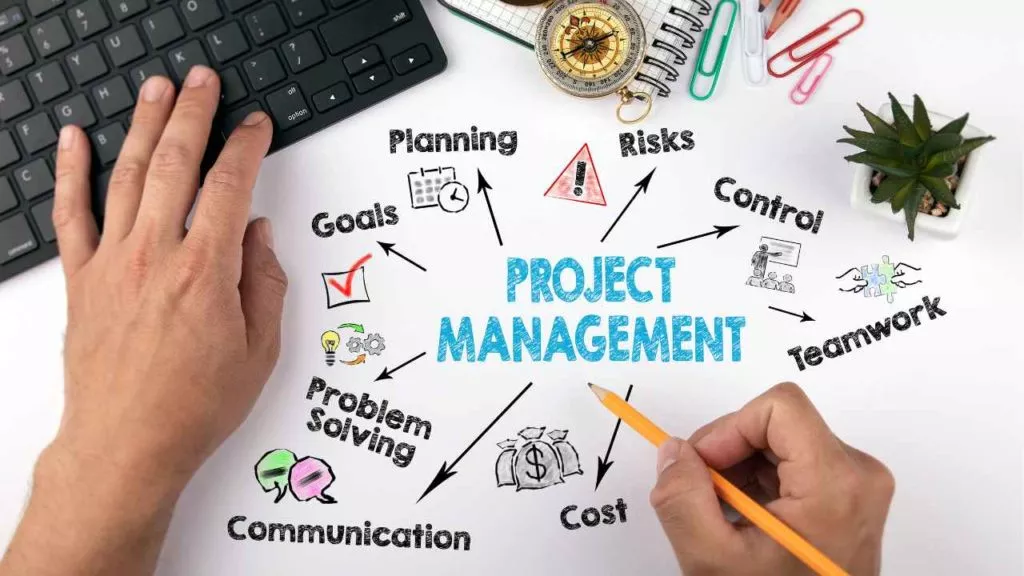Project management utilizes teams, tools, products, and other machinery to realize set goals and provide value to intended beneficiaries. Since it supports industries across all niches and sizes, experts believe that project management is one of the most important concepts for business. Companies without a strong background in project management will have a hard time succeeding, let alone surviving the ruthless competition.
Changing times demand higher quality services and stricter skill standards. Four out of five project managers agree that they require a portfolio in project management to remain competitive and render satisfactory services to their clients. Aside from possessing all skills necessary for their position, project managers should continuously improve while managing projects and fulfilling the processes needed in a timely manner.
One of the best ways for project managers to stay on top of the game is to keep learning. At first glance, learning about project management may seem a rigorous endeavor, but modern technology help simplify things. Today, interested individuals can upskill remotely through readily available e-courses.
Project management challenges will only get more complicated as time passes by. Whether handling big or small projects, you must keep up with trends and innovate. For this reason, exploring project management courses would benefit your career path.
What are the benefits of taking a project manager course?
One of the worst mistakes beginner project managers commit is failing to understand how the lack of project management skills severely affects the success of every project plan. It is good to be confident about one's skills but never complacent. Invest in project management courses because they will prepare you for foreseeable and unforeseeable problems.
Besides preparing for project management failures, taking relevant courses also help with the following:
- Unification of company ideas and goals
- Faster and more straightforward project planning
- Minimization of confusion and chances of disorganization
- Mitigation of project management failure and other related risks
- Reduction of costs relating to delays that severely exceed the project schedule
- Improvement of stakeholders' project management skills
- Improvement of team collaboration through better people management
- Increase workers' efficiency through the beneficial use of project management tools
- Better internal and external communication with all stakeholders, especially between co-workers
- Enhancement of leadership skills, even among employees handling non-leader positions
Becoming a project manager entails keeping up with business standards and industry demands. Your knowledge and skills should remain as sharp as ever to achieve project success consistently, regardless of high overhead costs and other budget constraints. No matter where you are in your career, always reserve time to take project management courses.

What to look for in a project management course
Every project manager and project management institute has unique needs. Instead of randomly picking project management classes to gain new and improved technical skills, it is wiser to identify your goals beforehand and analyze your best options.
If you do not know which project management courses to pick, try looking for these characteristics:
1. Easy to understand
Every person has a unique pace in studying and learning. It is better to choose a course that matches your preferences so that it will be easier to absorb and process new information. One way to do so is by checking the course outline and content distribution per chapter or section.
2. Well-organized
Another benefit of checking the course outline is that you can determine whether the program has a harmonious flow or not. It is easier to learn when a project management program has clear goals and the steps to achieve them are understandable. Students will only feel confused when topics jump from one to another.
3. Up-to-date
In 2023, the market will demand project managers to know how to handle fully remote teams. Since the pandemic, digitalization has been in full throttle, and the project development process can happen without physical interaction between project team members. Therefore, look for courses that enable the completion of project tasks through available sources found on the Internet.
4. Supports personalized learning
Recently, companies have started to agree that there is no singular best approach in project management and that it is ideal to opt for a hybrid approach. Further, project planning should always involve flexible methodologies to accommodate changing initiatives and ensure customer satisfaction. It makes sense to find courses that promote customized learning because project management is diverse.
5. Taken from reliable learning resources
Before taking any course, always double-check the resources that the course authors are using. Do more research on project management while choosing project management programs to ensure that your development is consistent and well-nurtured. Unfortunately, many project managers, both newbies and veterans, fall into the trap of learning an inappropriate or unverifiable development program.
6. Accessible
Many project managers refuse to continue learning or upskill because they have no access to education and training that can suit their needs. In addition, given their busy schedules, it is difficult to take some of their time to go to school and keep up with industry standards. Today, learning online is the best option.
Top 10 project manager courses on Skill Success
There are many things to learn to develop better project management skills. Fortunately, you do not have to get a project management certification to unlock the soft and hard skills needed for a specific project. Here are some of the best courses in Skill Success that will bolster your project management career:
1. PMP Project Management
This course is an extensive program on project management that details the roles of a project manager, interactions of project teams, drafting of project plans, and management of projects. It is an intermediate-level course that can provide substantive information for experts to do better in their positions and excel in future projects.
Learners will have a blast learning through each chapter with the help of user-friendly instructions and detailed visual aids. In addition, since this course's author has a Project Management Professional certification, students can feel assured that they are learning verified and highly educational information. You will have the best of both worlds—quality and dynamic learning.
2. Project Management: Deliver On Time and Scrum Project Delivery
Companies use several project management methods nowadays, but some of the most trusted ones include agile scrum project management and agile project delivery. If you are a project manager, scrum master, development team member, business owner, or any stakeholder in a project development program, this course is perfect for you. This program provides you with valuable inputs on project management from the lens of agile experts.
We recommend this course for professionals looking for a quick refresher on the subject. In less than an hour, you will learn fundamental concepts and practical tips for project delivery. You can finish this course in between your breaks.
3. Team Workflows in JIRA
JIRA administrators should always find ways to maximize JIRA's agile features. Unlocking hidden techniques and processes will significantly help teams build smoother and more consistent workflows. Further, this course will also discuss matters relating to creating new agile boards, customizing project workflows, fixing unexpected bugs, and other crucial procedures supporting the better functioning of all project team members.
Like other platforms, JIRA is constantly evolving to keep up with the needs of project team members across all industries. This course will also update your JIRA-related skills to keep you well-equipped against issues that may severely disrupt operations and project goals.
4. Setting Up a Real World Project in JIRA
Never underestimate the convenience and organization that JIRA can do for you and your company. If you are a JIRA administrator or stakeholder in development projects, consider taking this course. "Setting Up A Real World Project In JIRA" is a simplified guide for professionals on setting up and implementing JIRA for all company projects and operations.
This course will benefit professionals of all skill levels. The course author designed this program for beginners, but it is comprehensive and substantive enough that highly skilled professionals can learn and relearn fundamental skills. The video demonstrations make it easier for learners to mirror the processes involved in setting up JIRA in several circumstances.
5. Scrum Certification Prep Training + Agile Scrum Training
Preparing for your scrum certification can be pretty unnerving. One of the best ways to combat the nerves is to ensure that you have abundant knowledge and skills relative to the topic. This course is a simplified scrum refresher with discussions on the most practical project management techniques for complying with plans on time.
Scrum is an entirely different methodology from agile, and many professionals confuse one for the other. For this reason, the course author reserved some chapters making clear distinctions between the two. By the end of the course, learners should pick up the most fundamental concepts of the scrum methodology and their practical applications to daily operations.
6. Product Management: Agile Requirements Using Product Backlog
Product backlog is a prioritized functionality list that products should contain to manage projects seamlessly. Experts often refer to it as a "to-do list" in the scrum software development framework. If you are having trouble with product backlogs and their requirements, this course will not be a waste of your one hour and eight minutes.
Besides learning how to handle product backlogs, this course will also guide students in improving their project management skills regarding software development and user satisfaction. You will also explore tools like user stories and their significance in making your operations succeed amid inconsistencies and other issues.
7. Understanding JIRA for Users, Managers, and Admins
This course focuses on the three main JIRA functions that cater to users, managers, and administrators. This 6-hour lesson extensively discusses JIRA's core functions and how to use each function to the fullest and bolster team performance, especially in delivering company goals.
Completing this course will help users become more functional members of a project team, especially in resolving operational issues and implementing solutions with the help of JIRA's features. As a bonus, this course also discusses some of the most-asked customer questions regarding JIRA. This segment will help you learn critical aspects of the software and how to deal with its common issues.
8. Scrum Advanced: Software Development and Program Management
Scrum is a project management framework popularly used in software development but also finds application in other fields like marketing and sales. If you already have a background in this framework and wish to upgrade your knowledge and skills to be on par with Agile experts, this course will help you fulfill that goal.
Even experts find it challenging to understand and maintain the scrum program, so it is understandable for anyone to have repeated questions about its functions. This course will work you through matters such as running multiple projects with the help of the scrum method and improving the said projects' efficiency in the most practical way possible.
9. JIRA Visual Reference: Issue Administration
JIRA caters to several issue types, and this program has specific features to handle each. If you possess intermediate-level JIRA management skills and want to improve your ability to resolve project management issues, this course is right for you. Also, spending three and a half hours in this course will help you familiarize the most appropriate workflow schemes to apply to every problem.
At the end of this course, you should feel more confident handling project management issues through JIRA. The theoretical and practical knowledge you will acquire extensively applies to various workflows, screens, fields, and issue attributes. Since this is an e-course, you can pinpoint which lessons you can rewatch later.
10. User Stories for Agile Scrum: Product Owner and Business Analytics
User stories are highly relevant in project management since they assess and define users' reactions and interactions with products and their functionalities. This course is primarily for product owners, business analysts, and project managers who wish to upskill and better understand how to utilize user stories to improve company operations.
Creating user stories is challenging because it is a customized procedure requiring high critical analysis skills. Thankfully, this course could help you learn the most effective techniques in drafting user stories and using them to promote the company's growth. Since this course only lasts for thirty-six minutes, expect that the lessons are concise and simplified.
Also, this course comes with bonus materials you can cross-refer and utilize.

Tips for studying project management courses
Always take project management courses seriously, whether aiming to become a senior project manager or simply polishing some hard and soft skills needed for a new project. Your study habits will eventually transform into work habits, affecting your future as a project manager.
If you want to do better while studying project management lessons, take note of these tips:
1. Study smart, not hard
Studying smart is a good sign that you will become a good project manager. After all, project managers always look for optimal solutions for problems and unexpected events. One way to ensure the utmost efficiency of your study sessions is to ensure that you are in a conducive learning environment that is free from distractions.
2. Study one concept at a time
Like working on a project outline, only work on one thing at a time. It is safer and more time-efficient because you are least likely to commit mistakes and redo steps to correct them. Also, it is more humanly possible to absorb singular topics successively than hoarding multiple lessons in one go.
3. Observe real-life examples
Sometimes lessons are difficult to grasp because they seem too conceptual and lack a tangible relevance to you. To resolve this issue, try finding real-life examples and apply your learnings while seeing the said concepts in action. It is also easier to remember the ideas because you can relate them to actual and functioning examples.
4. Break long processes into simpler ones
Project management is a long and complicated process. The better way to understand the ins and outs of project management is to segment each process and study them individually. Most procedures follow steps and involve components that may not relate to others, so learners must inspect every process keenly.
5. Seek advice from experienced project managers
Besides listening to course authors, it is also wise to seek guidance from project management experts whom you know. Talking to experts in person is a different experience because you can control the conversation according to your preferences. Also, feeling another person's body language makes it easier for some information to get through.
6. Refrain from overworking yourself
Studying takes a lot of energy, so be conscious of how you deal with it. When you are too tired to study, it will be too taxing for the brain to absorb and keep information. Therefore, it is better to study when you are well-rested and stress-free.
7. Take more than one course
Do not limit your learning to one course only. Although two courses cover similar topics, one author may cover topics that the other ones did not. Also, studying at least two courses would help you verify the knowledge you acquired from a previously completed course.
Become a project manager with Skill Success courses
Becoming a better project manager takes time, energy, and sacrifices. However, after considerable progress, you will realize that everything will fall into its rightful place. You can expect more challenges, but also be confident that someone will be there for you.
Skill Success has been responsible for the evolution of project managers all over America. Our e-library is bursting with easy-to-learn project management programs while on a tight budget and schedule. Regardless of expertise, we are confident that our e-courses can positively impact the development of your project management skills.
Remember to tune in regularly because we release new courses often. There are more project manager courses to come.


